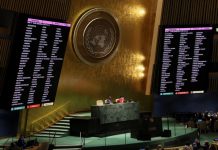According to state media reports, Iranian nuclear scientist Mohsen Fakhrizadeh was killed on Friday in an alleged assassination. Iranian Foreign Minister Javad Zarif attributed this death to Israeli involvement.
Fakhrizadeh, one of the top scientists behind Iran’s nuclear program, and the head of the research centre of new technology in the elite Revolutionary Guards, was targetted while travelling in his car in the eastern district of the Iranian capital, Tehran. His vehicle was apparently ambushed, according to state reports. Images from the scene depict the car with a shattered windscreen, and accompanied by blood.
ISNA, a semi-official Iranian news agency, reported that Iran’s Defence Minister Amir Hatani claimed that Fakhrizadeh was attacked by gunfire and a Nissan vehicle explosion leading to a firefight. The confrontation resulted in Fakhrizadeh’s killing.
Iranian Foreign Minister Javad Zarif termed the incident an act of “cowardice” and made claims of “serious indications of Israeli role.” He did not elaborate further.
Israeli Prime Minister Benjamin Netanhayu has declined to comment on these accusations, in keeping with the Israeli non-committal stance on such incidents. However, Netahhayu has, in the past, once when referred to Fakhrizadeh in a public address.
Giving a presentation in 2018 on what he claimed to be material stolen by Israel from an Iranian nuclear archive, he said: “A key part of the plan was to form new organizations to continue the work. This is how Dr. Mohsen Fakhrizadeh, head of Project AMAD, put it.”
“Remember that name, Fakhrizadeh,” he said.

Fakhrizadeh’s assassination is the latest in a series of fatal attacks on prominent Iranian scientists and academics. In 2010, Masoud Ali Mohammadi, a particle physics expert, and Majid Shahriar, a nuclear scientist, were killed in separate yet similar incidents of road ambush. In 2011, academic Darioush Rezaeinejad, purportedly involved in the country’s nuclear program, was shot by gunmen on motorcycles. In 2012, Mostafa Ahmadi Roshan, deputy head of Iran’s uranium enrichment facility at Natanz, was killed in a bomb attack while driving.
The latest prominent assassination suffered by Iran was the killing of Qassem Suleimani, one of the most powerful Iranian generals, by a US drone strike in early 2020.
The incumbent President of the United States, Donald Trump, on Fakhrizadeh’s assassination, retweeted a prominent Israeli journalist Yassi Melman.
“Fakhrizadeh-Mahabadi assassinated in Damavand, east of Tehran according to reports in Iran. He was head of Iran’s secret military program and wanted for many years by Mossad. His death is a major psychological and professional blow for Iran,” Melman wrote.
Many top-level Iranian officials have vehemently condemned the attack on Fakhrizadeh. According to ISNA, the head of Iran’s Revolutionary Guards Corps, Hossein Salami, called the killing a “terrorist operation.”
“The blinded enemies of Iran, particularly the planners and coordinators of this cowardly act of terrorism must understand that such savagery will not cause a single wrinkle in our collective will to conquer bright scientific horizons, and be aware that the difficult revenge awaiting them is already an integral part of our work,” Salami said, as per ISNA.
The Chief of Staff of the Iranian Armed Forces, Major General Mohammad Bagheri, termed the attack “a bitter and heavy blow to the country’s defence complex,” according to state agency IRNA.
Naim Qassem, the second-in-command of Hezbollah, the Iran-backed Lebanese militant group, also condemned Fakhrizadeh’s assassination and accused Israeli and US forces of being responsible.
“We condemn this sinful attack, and we see that the response to this crime is in the hands of those concerned in Iran. We are not shaken by assassinations,” he said.









